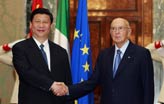Op-Ed Contributors
Sea dispute a real test for China
Updated: 2011-06-08 07:56
By Gong Jianhua (China Daily)
Vietnam and the Philippines have been strengthening their marine forces by pumping oil from the sea, stationing troops strategically and using oil revenue to fund their militaries. Their common strategy in the South China Sea dispute is a great challenge to China's principle of "shelving disputes and seeking common development".
To maintain regional peace and stability in the South China Sea, China and member states of the Association of Southeast Asian Nations (ASEAN) signed the "Declaration on the Conduct of Parties in the South China Sea" in 2002. The declaration emphasizes the peaceful settlement of the South China Sea dispute and says that all parties should refrain from activities that could complicate and escalate the dispute.
China has been strictly abiding by the declaration, which is the mark of a responsible country. Though some other signatory countries have indicated that they would comply with the declaration's basic principles, their actions have been violating them.
The declaration explicitly stipulates a peaceful solution to the dispute but the actions of Vietnam, the Philippines and some other countries are complicating it further. To all intents and purposes, the declaration has failed to prevent countries like Vietnam and the Philippines from taking actions not conducive to a peaceful settlement of the dispute. In fact, some countries are using it as an "umbrella" to shield their plundering in the South China Sea and breaking the "consensus" over the dispute.
In the beginning, the South China Sea dispute was not referred to any international or regional organization. But after the formation of ASEAN, Vietnam, the Philippines and some other countries used it as a regional political platform to coordinate their positions to "speak in one voice" and gain strategic advantage against China.
The Philippines has repeatedly said that the dispute is not just a bilateral issue between China and the Philippines but a multilateral issue concerning related Southeast Asian countries. It has even advocated resolving the issue through ASEAN, the International Court of Justice and the United Nations Security Council.
Besides pumping oil and natural gas on their own, Vietnam, the Philippines and some other countries are sparing no effort in inviting multinationals to explore and exploit the resources in the South China Sea. They are trying to exert more political pressure on China by drawing the countries where the multinationals are based into the dispute.
The diversification of the region's power structure has complicated the South China Sea dispute further. Since ASEAN member states are its geographical neighbors, China has made developing relations with them one of its diplomatic priorities - Beijing's efforts to launch a China-ASEAN Free Trade Area have actually been successful.
But the United States has jumped into the dispute to contain China's rise and maintain its hegemony in the Asia-Pacific region. And since Japan attaches great importance to developing ties with ASEAN to maintain its leading role in Asia, it has shifted its investment and diplomacy focus to the region.
ASEAN, on its part, wants to find a balancing point among China, the US and Japan. So in the South China Sea dispute, China, ASEAN and the US-Japan alliance form a pluralistic power structure, with the relationship between any two of them being complicated.
Since the dispute involves a number of stakeholders, whose political stance, bottom line, tactics and sincerity to find a resolution are quite different, it is easy to reach a strategic agreement but very difficult to come to a generally accepted settlement.
For China, the South China Sea dispute is an issue of strategic significance, specifically for two reasons.
First, China is a large country but not a formidable sea power. Although China's exclusive economic zone and continental shelf are extensive and the coastline of its mainland and islands is long, they are small in per capita terms. With only a small number of disputed islands under its actual control, China lacks channels that connect the sea to the ocean.
Second, without a formidable navy and sufficient emphasis on maritime interests, China is in an unfavorable position. To become an influential power, China has to transform from a "continental power" to a "maritime power". And the South China Sea dispute is a real test for it to achieve that goal.
In essence, the South China Sea dispute involves sovereignty and resources. China insists on peaceful settlement of the dispute, but the aggressive actions of some ASEAN member states have intensified the contradictions. An armed conflict can only undermine the good diplomatic environment and affect the current strategic opportunities.
China has always employed friendly and tolerant methods to settle disputes over territorial sovereignty. When it comes to diplomacy, China keeps a low profile; to resolve territorial disputes, it "shelves disputes and seeks common development"; and for maritime strategy, it insists on "offshore defense".
China has been sincere in developing good-neighborly relations, promoting cooperation and seeking common development with its neighbors. It has exercised great patience and considerable restraint in dealing with the South China Sea dispute. But some countries have been repeatedly challenging its interests.
Hence, it is time China took a comprehensive approach toward the South China Sea dispute and mulled a strategic arrangement that would not only safeguard its territorial sovereignty, but also maintain its overall strategy of peaceful development. Also, it should guard against the trap set by some countries - using the South China Sea dispute - to cripple its development.
The author is a professor at the School of Politics and Public Administration, Guangdong Ocean University.
E-paper

Harbin-ger of change
Old industrial center looks to innovation to move up the value chain
Chemical attraction
The reel Mao
Improving app-iness
Specials

Vice-President visits Italy
The visit is expected to lend new impetus to Sino-Italian relations.

Birthday a new 'starting point'
China's national English language newspaper aims for a top-notch international all-media group.

Sky is the limit
Chinese tycoon conjures up green dreams in Europe with solar panels
